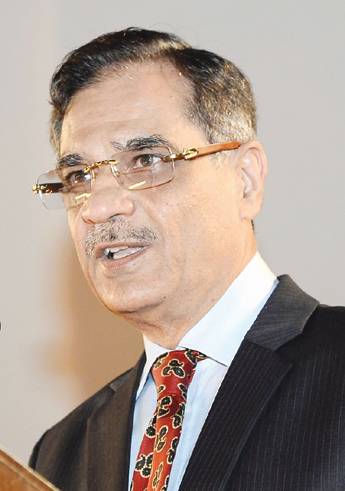ISLAMABAD - Chief Justice of Pakistan Mian Saqib Nisar Monday said the disposal ratio of cases till the end of judicial year 2017-2018 was higher as compared to the last five years while a major contributing factor to the backlog of cases was frivolous litigation.
Chief Justice Mian Saqib Nisar, addressing a ceremony to mark the commencement of Judicial Year 2018-19 at the Supreme Court building, said 37,000 cases were pending adjudication in the top court in the previous judicial year out of which a total of 19,000 cases were decided.
“Although this year the rate of disposal was higher than the last five years, the number of pending cases increased slightly,” he said.
All the judges, Attorney General for Pakistan (AGP) Anwar Mansoor Khan, Pakistan Bar Council Vice-Chairman Kamran Murtaza, Supreme Court Bar Association of Pakistan President Pir Kaleem, members of both the bodies and law officers attended the ceremony. Anwar Mansoor Khan, Kamran Murtaza, Pir Kaleem also addressed the event.
During his speech, the CJP said a major contributing factor to the backlog of cases was frivolous litigation. Furthermore, he added, unnecessary adjournments and customary delaying tactics severely hampered the process of clearing the backlog of cases.
The chief justice maintained that in the past year, the top court had been the most stringent in this context with a zero-tolerance policy to any form of unnecessary delay. “The maximum possible cases were fixed and heard and the judges and the judicial staff worked and continue to work tirelessly, sometimes even on all seven days of the week,” he added.
The CJP said the biggest initiative of the top court was regarding the construction of Diamer-Bhasha and Mohmand dams.
“To my mind, one of the biggest feats of the Supreme Court of Pakistan was the direction to the government to immediately begin construction of Diamer-Bhasha and Mohmand dams to address the issue of water scarcity and security that Pakistan currently faces,” he said.
“Unfortunately, Pakistan has deviated from the Quaid’s vision. Bad governance and injustices have plagued the society. We tried, as the guardians of the Constitution, to play our part by involving ourselves in various constitutional and human rights matters either through the court or the Human Rights Cell,” he added.
These cases include undisclosed foreign accounts of Pakistani nationals, dual nationality of government officials and judges, nonpayment of salaries to media employees, killing of members of Hazara community in Quetta, inadequate medical services at various hospitals, depletion of the water table at Katas Raj Temple and extraction of ground water for commercial use without payment of charges, revamping of medical, dental and law colleges and practical implementation of overseas Pakistanis’ right to vote via Internet voting According to the chief justice, the primary concern of all these initiatives was to ensure enforcement of the various fundamental rights guaranteed under the Constitution.
He also appreciated the legal fraternity for sharing the burden, in the shape of assisting the bench, in ensuring the enforcement of various fundamental rights.
“While we discharge this duty, let me remind the bar that it shares the burden of this duty with us and must contribute as counsel and amicus curiae to ensure that the task of upholding the spirit of the Constitution is given utmost primacy,” he added.
“Other practical initiatives taken in aid of lawyers and the litigant public included the issuance of proposed cause lists in advance to enable counsels to prepare briefs and make necessary arrangements for their appearance, simplification of the process of filing of applications and capacity building through training courses at the federal and provincial level,” he added.
The chief justice also recalled a number of law reform reports prepared by Law and Justice Commission of Pakistan.
Till date, the chief justice revealed, the commission has approved 138 law reform reports for consideration of the legislature, out of which 74 legislative reforms are in the process of implementation.
“One of the initiatives taken through the commission is that of police reforms whereby a police reform committee comprising serving and retired senior police officers was constituted. The committee came up with a concrete proposal for a uniform model law with the primary objective of giving the police optimum independence, freeing it from the handcuffs of extraneous influences,” he added.
Other reforms include the drafting of a bill by a committee formed to safeguard the rights of children and prohibit their employment at delicate ages. Another committee was formed to suggest legislative safeguards for the rights of trans-genders through the formulation of an inclusive policy framework, he affirmed. Later, a full-court meeting chaired by Chief Justice Mian Saqib Nisar was also held. The meeting reviewed the institution and disposal of cases, expressing satisfaction over the overall performance.
The full court noted that during the current year from January to August, 13,384 cases were disposed of against the institution of 15,175 cases.
“If the court works with the same pace, the disposal would rise to more than 20,000 cases, which would be the highest disposal figure in the last five years,” it was further observed.
The full court deliberated upon different strategies for effective functioning of the court and suggested ways and means so that dispensation of justice could be further improved and relief provided to litigants.
SYED SABEEHUL HUSSNAIN






